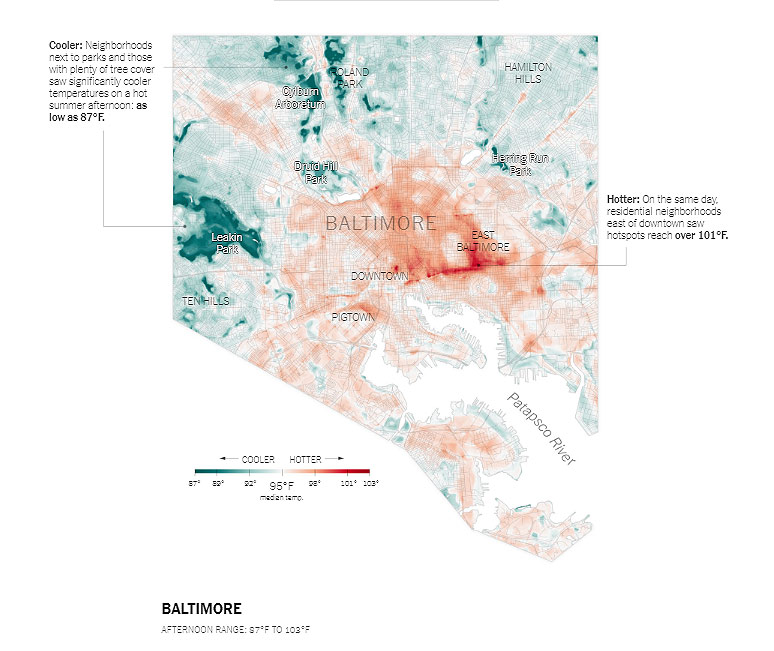Heat islands are urban area that are significantly warmer than the surrounding areas due to over development.
The Intersections of Racial and Environmental Justice: The Inequality of Urban Heat Islands
Written by: Len Heckwolf
The following are my observations, findings and suggestions about racial and environmental inequalities in America.
As 2020 propels us forward, many of us have been compelled by the recent examples of blatant racism in our country to examine our own lives and how we overtly or negligibly commit sins of racism. My own personal reflection brought me back to a study I conducted in graduate school on the severe health impacts Baltimore residents who live in low-income neighborhoods will face as a result of an effect termed “Urban Heat Islands”.
An Urban Heat Island is an environmental effect caused by areas of high-density human development: ample asphalt, dark colored roofing, lack of trees, and other human-created effects. These result in areas of very high temperatures as compared to adjacent areas that do not contain the same conditions. For example, there is so much more green space that can be found in Roland Park as compared to the lack thereof in Sandtown.
These disparities are amplified by economic conditions that create an inability to mitigate these conditions on both a long term basis and short term basis. Trees are not typically being planted in these neighborhoods, and many residents are not able to purchase or operate air conditioning. Furthermore, many people will pay more for their utilities as a result of needing to pay their utilities through intermediary operators. All of this results in a severe Urban Heat Island with little chance of mitigation.
The result of these conditions is that the residents of East and West Baltimore experience much higher temperatures in their neighborhoods and homes than those of wealthier areas such as Roland Park, Towson, Ruxton, et al. These differences are often more than 10 degrees Fahrenheit.
Here, you will find a more recent study conducted by the Howard Center for Investigative Journalism / CNS / and NPR. Please take the time to read through it. Often we hear debates about whether an issue is backed by science and fact or is opinion, but there is no ambiguity about Urban Heat Islands. If you live in one of the red-lined, segregated neighborhoods in Baltimore City, you suffer from the heat more and you possess less ability to mitigate the circumstance through economic means. Read the science and understand the facts. Then we who have the means need to ask ourselves what we are going to do about it.
Visit the Environmental Justice Subcommittee page here.

If you are interested in learning more or would like to join us in combatting heat islands contact Terry Cavanagh at tcavanagh@seiumddc.org or Len Heckwolf at lenheckwolf@gmail.com
Read more about heat islands in the following articles!
https://cnsmaryland.org/interactives/summer-2019/code-red/role-of-trees.html